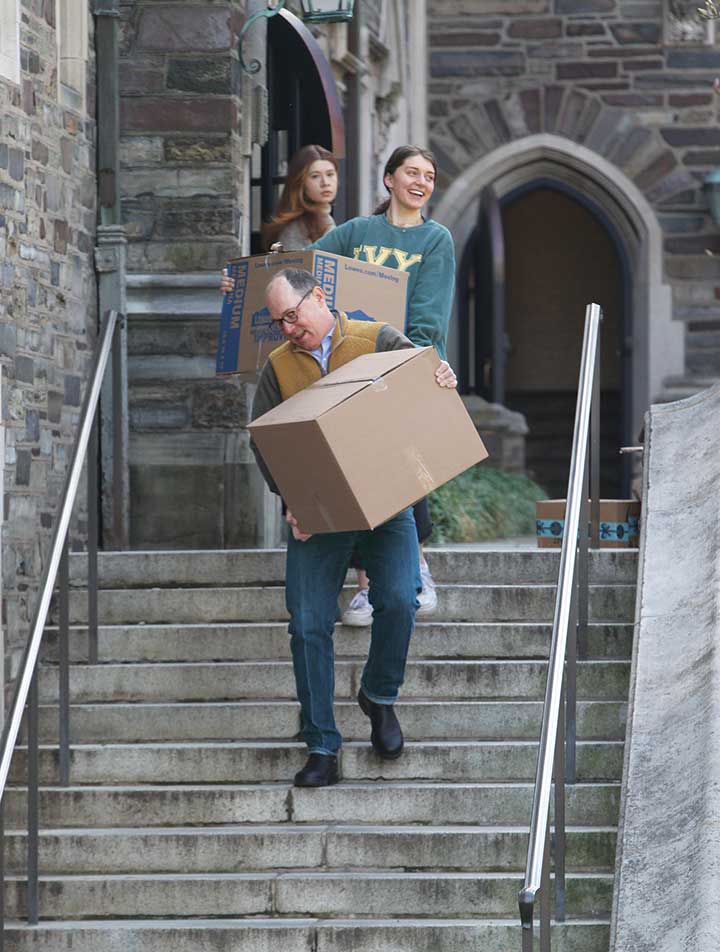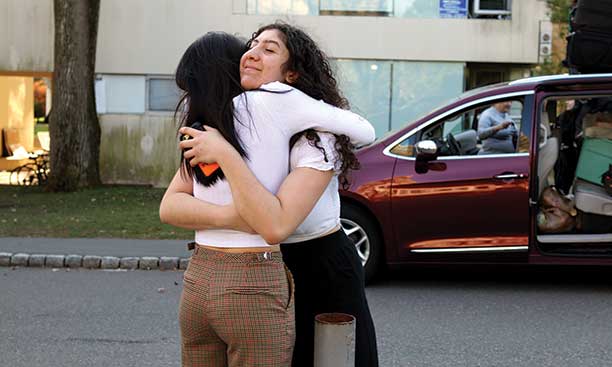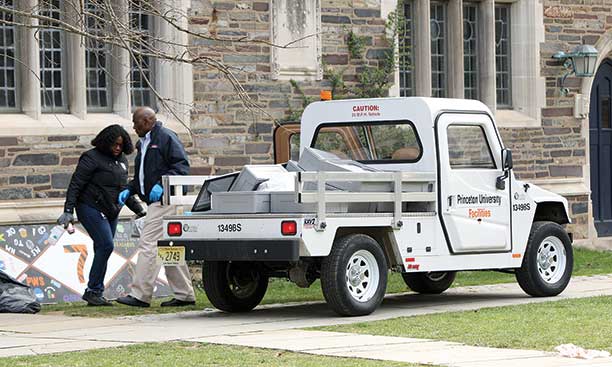Coping With COVID-19
Pandemic sends undergrads home as Princeton shifts to online instruction
The week of March 9 was unlike any other at Princeton. In response to concerns about the spread of the 2019 novel coronavirus (COVID-19), the University undertook a rapidly evolving series of measures that included the temporary move of all classes to online instruction, the cancellation of all athletic contests for the spring season, and ultimately a decision for all undergraduate students to return home, except for those whose academic, financial, travel, housing, or immigration and visa situations made it necessary to stay. The global coronavirus outbreak had already disrupted the studies of undergraduates in study-abroad programs, but the new measures touched every aspect of student life.
While campus historians have noted other instances in which Princeton sent or kept students home to guard against the outbreak of disease — smallpox in 1871, typhoid in 1880, polio in 1916 — those took place before the student body represented such a large swath of the country and, indeed, the world. International students now make up about 12 percent of undergraduates and 43 percent of grad students, according to the registrar’s website. The following timeline highlights some of the developments of an eventful week.
Monday, March 9, 2020
The rumor mill of what was to come started in the early hours of the morning, soon after updates to a University web page about coronavirus were accidentally published and then removed. Around 9 a.m., President Eisgruber ’83 released an official letter confirming the earlier news: Princeton planned to move all lectures, seminars, and precepts to virtual instruction starting March 23, after spring break.
“Though we recognize that a personal, ‘high-touch’ educational environment is one of Princeton’s great strengths,” Eisgruber wrote, “we also recognize that these are extraordinary times that require exceptional measures to deal with a health risk that affects us all.”
Students at Frist Campus Center had mixed reactions to the news while weighing their options. Matthew Helm ’20, a mechanical and aerospace engineering major, told PAW he hoped to stay on campus because he needed to use the machine shop for his thesis work. Leaving campus “would put me back two weeks, which is a long time to not be working,” Helm said.
Later in the day, Gov. Phil Murphy declared a state of emergency and public-health emergency across the state of New Jersey.
Tuesday, March 10, 2020
The University announced that two staff members were under self-quarantine as a result of possible exposure to COVID-19 at an off-campus gathering. Both were being tested and awaiting results.
More extensive guidelines were announced, discouraging large gatherings. As a result, a host of campus events were canceled, including April’s Princeton Preview program for admitted students. The Admission Office put information sessions and campus tours on hold as well. The University was slated to reassess its guidelines by April 5, and according to Alexandra Day ’02, Princeton’s deputy vice president for alumni engagement, “discussions are ongoing about events beyond that date.” (Reunions was later canceled — see page 17.)
In athletics, the Ivy League presidents decided to cancel the upcoming Ivy men’s and women’s basketball tournaments, scheduled to be held at Harvard March 13–15. The league was the first in the country to cancel postseason games, a decision that was based on guidance from public-health and medical professionals. A handful of conferences announced plans to play their tournaments without spectators.
Wednesday, March 11, 2020
At 8 p.m., students received an urgent email informing them of updated plans: All undergraduates were to leave by 5 p.m. March 19 and remain off campus for the remainder of the semester, except for those with situations that made it necessary to stay.
“We know you’re heartbroken at the prospect of leaving your friends, professors, and other campus colleagues,” Dean of the College Jill Dolan and Vice President for Campus Life W. Rochelle Calhoun wrote in the letter to students. “And we know this is not how you expected to study and participate in campus life at Princeton. ... But our number one goal during this crisis is to ensure the health and safety of our students and community.”
Undergrads coped with the news at impromptu parties and roamed around campus in groups, trying to take advantage of remaining time with friends. At 11:35 p.m., some were launching fireworks over Poe Field. At midnight, at least 100 students gathered outside Frist Campus Center to collectively scream as part of an event — circulated on Facebook and titled the “Pre-Break Bellow/End of Semester Scream” — modeled on the traditional Holder Howl that occurs at midnight on Dean’s Date in Holder Courtyard.
The students’ need for closure, however, was at odds with the University’s social-distancing policies, which attempted to limit large gatherings that increased the risk of transmitting illness.
As undergraduates were beginning to pack their bags, graduate students received an email from Calhoun and Dean of the Graduate School Sarah-Jane Leslie *07 stating that they were allowed to stay on campus and their housing would remain unchanged. Grad students also had the option to leave campus and cancel their housing contracts if they were “able to continue to make academic progress remotely,” the email said.
“We know you’re heartbroken at the prospect of leaving your friends, professors, and other campus colleagues. … But our number one goal during this crisis is to ensure the health and safety of our students and community.”
— Dean of the College Jill Dolan and Vice President for Campus Life W. Rochelle Calhoun
Earlier in the day, the website Planet Princeton reported that a total of five attendees of a private party in Princeton tested positive for the coronavirus, but test results for the two Princeton staff members who had attended were not yet available. University Health Services announced the suspension of routine appointments and moved Counseling and Psychological Services appointments online. Also, the Ivy League canceled all athletics spring competitions for the remainder of the semester. A day later, the NCAA called off the rest of the winter and spring seasons.
A handful of petitions from students were circulating: One requested that the University consider reevaluating the weight of midterms, held during the students’ last week on campus; another asked Princeton to ensure that students would not be evicted from the campus. University officials acknowledged both concerns, advising faculty to consider adjusting their grading rubrics and providing additional guidance for departing students.
Thursday, March 12, 2020
The University announced that one student who was exhibiting flu-like symptoms had been placed in isolation at McCosh Health Center, pending the results of a test for COVID-19. (The test was negative, according to a March 17 University update.)
In the hours after University officials announced that most students would have to vacate campus, the Princeton University Store at 36 University Place sold out of cardboard boxes. In response, the University announced that each student could receive four boxes and two rolls of tape for free at Dillon Gym.
Concerns were addressed in an FAQ page at emergency.princeton.edu: Students who met the criteria to stay on campus were to register by noon on March 13. The site also noted that those on financial aid would receive a $150 credit to their student accounts to help with moving expenses.
Princeton students who were abroad in Europe, the United Kingdom, and Ireland received emails urging them to return to their permanent residence as students in Italy and other high-risk countries had done already. The update was in response to a 30-day government ban on travel between the United States and Europe beginning March 13. Some students requested to stay abroad, according to the Prince, and received a follow-up email from study-abroad adviser Johanna Wagner telling them they must sign a form releasing the University from various responsibilities.
Friday, March 13, 2020
The University shared news from the New Jersey Health Department that one of the two Princeton staff members under self-isolation had tested positive for COVID-19. “The staff member remains in self-isolation, and we are working to ensure they have the support and access to care that they need,” said a message posted on the University website. People who had been in close contact with the two staff members were contacted and began self-quarantine as a precaution.
In a move announced earlier in the week, all 11 eating clubs shut down. The University also announced all academic and administrative buildings would be locked and only accessible by Princeton ID cards, beginning March 14.
Amid the commotion of packing and making travel plans, some seniors found time to complete Princeton traditions, including a departure through FitzRandolph Gate. “It’s definitely not the way I had expected I’d walk through FitzRandolph Gate,” Alaa Ghoneim ’20 told PAW. “It’s disappointing that we might not have the ceremony that I’ve dreamed of for the past four years. I’m kind of conflicted because I know we should be practicing social distancing, but it was kind of a nice last thing that we could do. I think we’re still hopeful that things will get better and that we’ll be able to come back for Commencement.” Former Undergraduate Student Government president Zarnab Virk ’20 added, “The whole thing was arranged very informally, but I’m glad the Class of 2020 got to have one last unifying experience.”
Not all festivities were as tame as strolling through the gate, though, and in response to large gatherings and “disruptive behavior,” Dean of Undergraduate Students Kathleen Deignan wrote a message to students warning that “continued violations of University health and safety guidelines and University policy may result in disciplinary consequences.”
Saturday and Sunday, March 14–15, 2020
Over the weekend, two more cases of Princeton staff members with coronavirus were confirmed, bringing the total to three. The University announced new guidance for staff members, encouraging work-from-home arrangements for those whose duties did not require them to be physically present and safe-distancing precautions for those who still needed to be on campus.
Richard Wilder, senior storage facilitator for building services and the vice president and treasurer of Service Employees International Union (SEIU) Local 175, told PAW that the union was working with Human Resources to figure out the best way to reduce the presence of staff members on campus and ensure their safety. Vice President for Human Resources Lianne Sullivan-Crowley announced in an email to all staff that employees could take a limited number of additional days off if they faced hardship situations related to the coronavirus.
The editorial board of The Daily Princetonian suggested that, in the midst of uncertainty about online classes, the University should adjust its grading scale for the spring semester. “While we commend the University’s efforts to protect students and anticipate the myriad difficulties they will face, we remain concerned about Princeton’s transition to the virtual classroom,” the editorial board wrote. “While acknowledging it is an imperfect solution, this Board holds that the University should move all classes to a P/D/F-only grading scale.” In a March 19 email to students, Dean Dolan outlined an expansion of the P/D/F option for the spring semester.
On a warm, sunny Sunday afternoon, though traffic was quieter than usual, students and community members still strolled down Nassau Street, stopping for lunch at PJ’s Pancake House or Panera, thumbing through the books on tables outside Labyrinth, and visiting the Art Museum’s exhibition space at Bainbridge House. Twenty-four hours later, downtown Princeton would be a different place: The usually coveted parking spaces along Nassau Street were empty, restaurants were shutting down, and Art@Bainbridge was closed. The few people walking on the street often turned away from each other as they passed.
Virtual classes were still a week away at that point: Princeton’s spring break had just begun.












1 Response
Kenneth McCarthy ’81
5 Years AgoPushing Back Against Public-Health Measures
I understand the actions taken by leaders in government, industry, and academia in the heat of the COVID-19 crisis. We were all dealing with seemingly reliable representations that were truly alarming.
What is a little less easy to understand — or excuse — is the current lack of intellectual curiosity about very clear statements, well supported by reliable data, from qualified public health and epidemiologists academics at places like Stanford and Yale that there was a most definite “spirited overstatement” of the case (I’m being polite) by entrenched members of the federal health bureaucracy who have a long history of making alarmist statements that later prove to be false.
I respectfully suggest that Princeton take the lead and join with other Ivy League schools and top tier academic institutions and take aim at the tyranny of the NIH which is the source of many problems, intellectual, scientific, social, and now economic.
Our country simply cannot continue to be viable with the current people and system in place.
As the results of their handiwork have demonstrated in this latest episode, they are far more dangerous and destructive than any pandemic or military threat our nation faces.